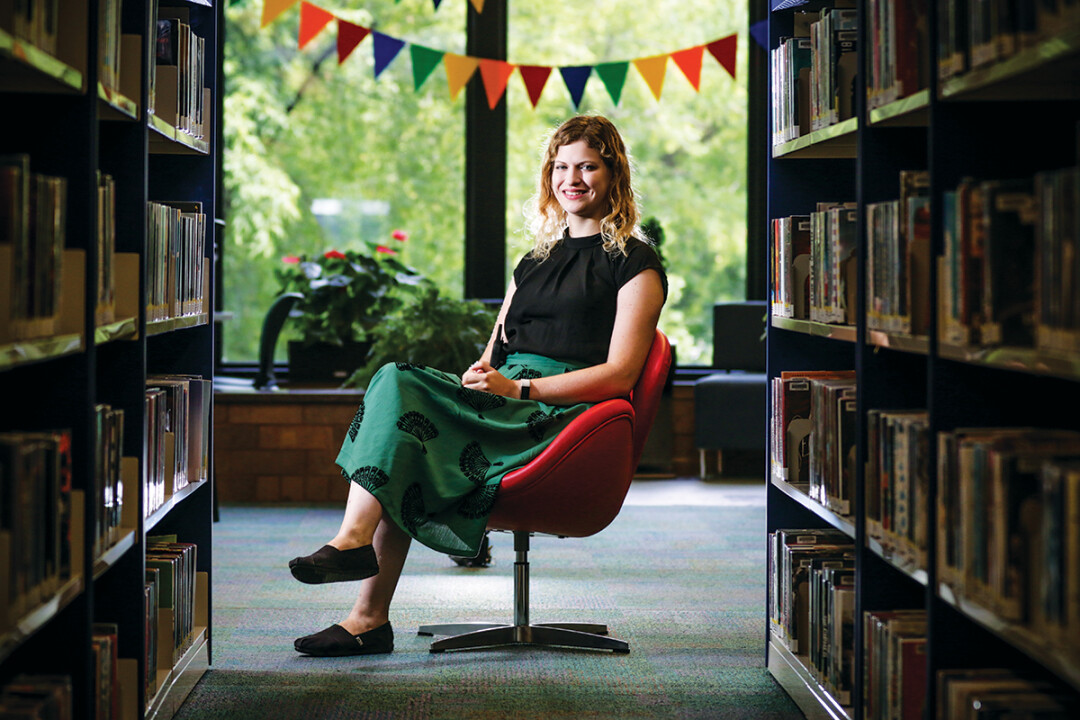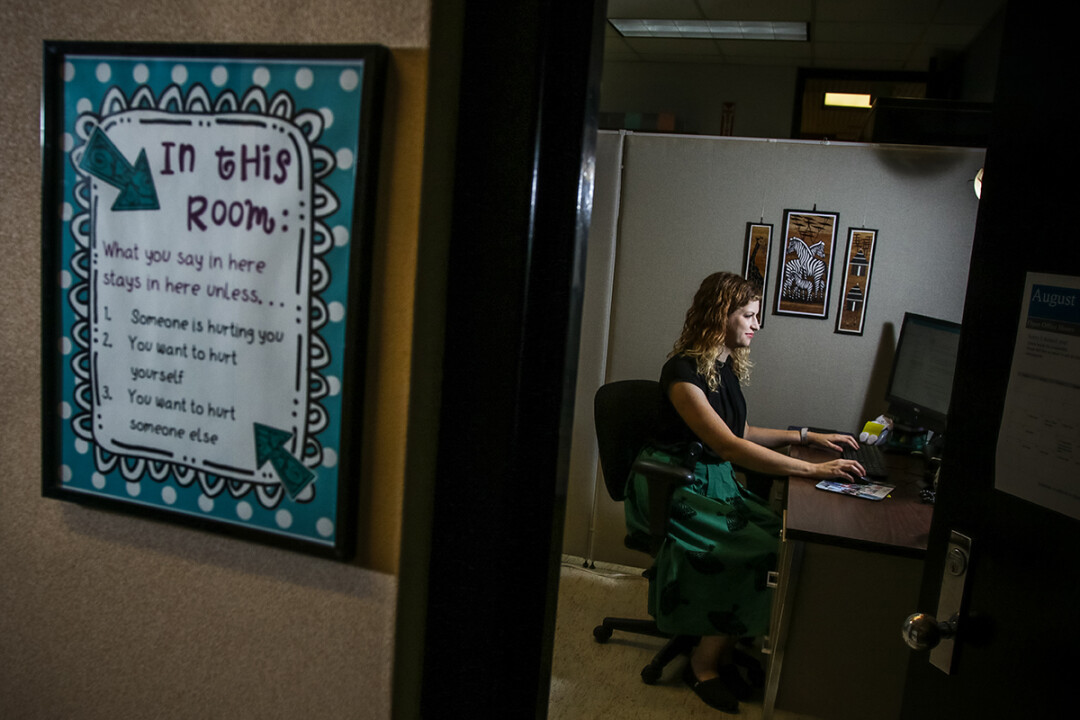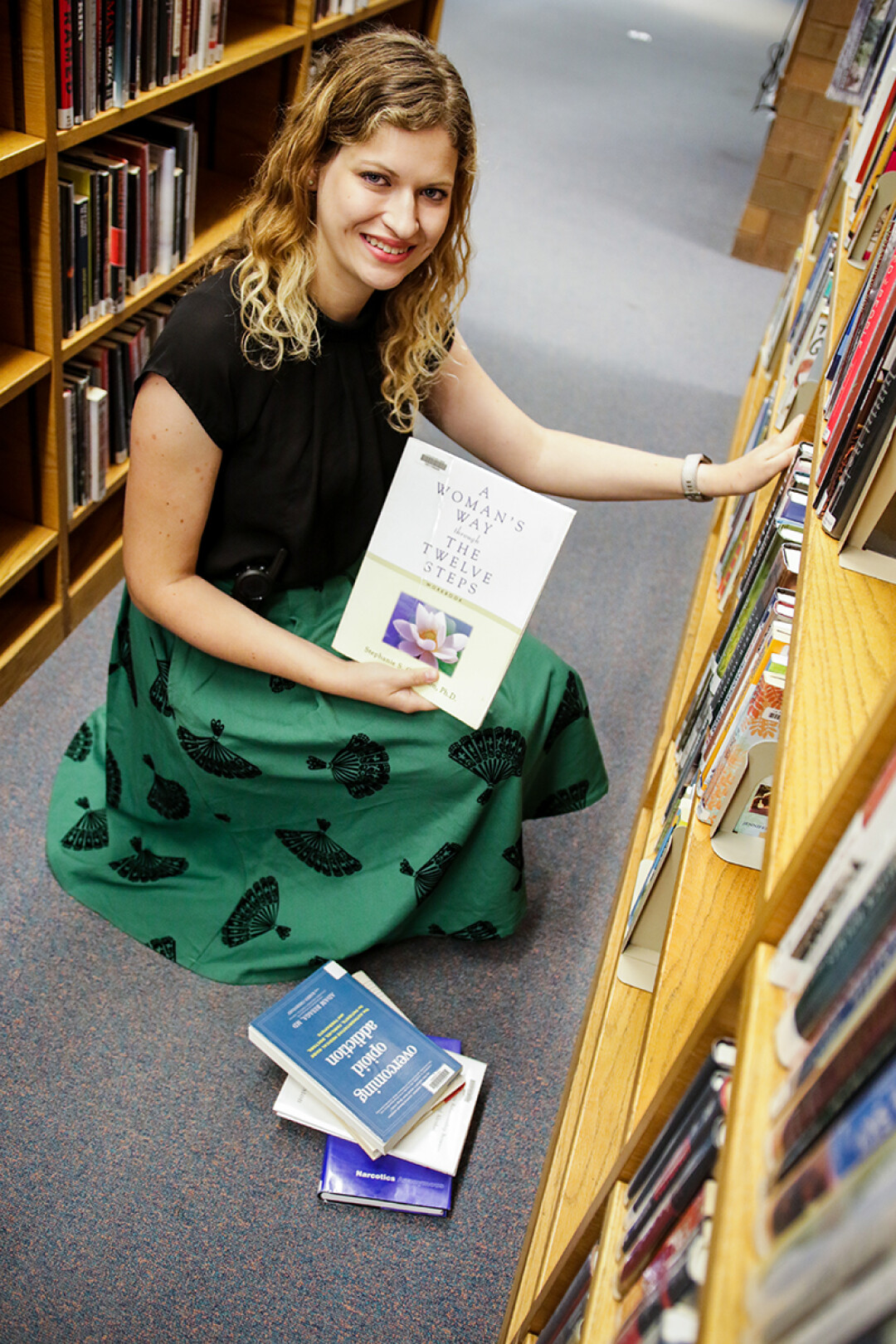A Helping Hand
the L.E. Phillips Memorial Public Library's new social worker is ready to serve
Rob Reid, photos by Andrea Paulseth |

The L.E. Phillips Memorial Public Library in Eau Claire is one of only 40 public libraries in the country that has a certified social worker on staff. Libby Richter, a graduate of the Social Work program at the University of Wisconsin-Eau Claire (UWEC), was hired to work at the library in the new role of Community Resources Specialist.
Richter’s first day on the job was April 1st – an April’s Fools Day reference she and the library staff will lightly point out – but in all seriousness, they know the positive impact the job has on the community.
Why Is There a Social Worker in the Public Library?
The staff at Eau Claire’s public library has been discussing how to deal with challenging behavior from patrons for years. This included people who were confrontational to staff: who swore, yelled, smoked, snored while turning seats into beds, or visited while intoxicated. Security guards were employed to assist with these situations in the past, but that proved to be an unsuccessful approach. Security staff project a different message with their presence – more confrontational and reactive to situations vs. being proactive in handling problems.
Visitors gave negative feedback to staff at the reference and circulation desks as well as library director Pamela Westby. Some patrons complained the library was turning into a homeless shelter.
“For some, they were not comfortable bringing their children and stopped visiting the library,” Westby said. A few staff members also quit because of confrontations with customers exhibiting difficult behavior.
In recent years, staff has had access to new types of training, including an all-day mental health first-aid course and a series designed for library workers who serve those experiencing homelessness.
“This instruction has been helpful for staff to better understand issues some customers face, but they do not address more involved situations,” Westby said.
“Librarians are not trained to assist people in crisis mode, such as those experiencing flashback due to post-traumatic stress disorder, addictions, or dealing with an abusive family situation. That’s where the social worker’s experiences become invaluable.”
The primary functions of the new position are to ...
• Work directly with customers needing assistance by providing information, support, and referrals to appropriate organizations.
• Serve as a resource for library staff and model effective techniques for working with customers experiencing mental health, substance abuse, unstable housing, or exclusion issues.
• Actively connect with customers to build productive relationships.
How Did the L.E. Phillips Memorial Public Library Hire a Social Worker?

Director Westby has been following the national movement of adding social workers to public library staff for some time. She knew the San Francisco Public Library hired a trained social worker in 2009. In fact, the entire library field paid attention to this proactive move.
According to National Public Radio, “The Public Library Association started a task force meant to develop and recruit a strategic and coordinated approach for libraries trying to do better to address the social service needs of their patrons.”
Actor and director Emilio Estevez, whose 2018 movie “The Public,” a film portraying shifts in the roles of today’s libraries, states “What most librarians went to school to study and earn a degree in has very little practical application on the floor. A modern-day librarian is now a de facto social worker and first responder.”
Library staff made a presentation called “Extending Our Reach” to the Eau Claire City Council during a budget work session in November 2018. They showed ways the library can work with the city on issues of poverty and related initiatives, as well as early literacy. Council member Catherine Emmanuelle worked closely with library staff to garner council support, including demonstrating how the social worker position, officially called the Community Resources Specialist, aligns with both city and library strategic goals.
The city council approved funding for the position December 2018. Richter, who has experience with both professional worlds, was hired. Not only is Richter a licensed social worker, she has had a special connection with libraries her whole life. Her mother encouraged her to work in libraries. She was a page at the Menomonie Public Library and she also worked at UWEC’s McIntyre Library while attending college. Now, Richter says, with this new job, she can combine her two passions of social work and the library field.
Richter and the library staff gained a lot of support and insight from Mary Nienow, Assistant Professor for UWEC’s Social Work Department. Nienow is co-author of a new book titled Whole Person Librarianship: A Social Work Approach to Patron Services (Libraries Unlimited, 2019). Nienow’s direction and encouragement to the library included the advice that while there is no fixed blueprint for this job, the possibilities are endless. She told Richter, “You’re building the plane as you’re flying it.”
What Has Been the Impact So Far?
“Sometimes, people are looking for better versions of themselves,” Richter said. As the Community Resources Specialist, she is in the position of not only assisting people directly, but helping the librarians hone their informational skills to find resources for folks with challenges including housing issues, education, employment, family matters, domestic violence, childcare, elder issues, financial resources, crisis support, food, clothing, mental and physical help, health insurance, and substance use.
As one can imagine, each day is different for Richter. Sometimes, a partnering organization will alert someone in need to her services. Other times, library staff members might send someone her way. Once, as Richter was leaving the library, staff members told her about a man who was frantically pacing throughout the library. Richter starting walking around the building with the man, talking to him and learning his story. She consciously slowed down their pace, helping bring the man to a state of equilibrium. He was able to calm down and cope because of her intervention.
Richter adds this about her approach in the library: “The library is embracing the diversity of our community and finding new ways to serve these various needs. It’s about not criminalizing socially inappropriate behavior that mental health may bring on, and instead finding a way for everyone to be comfortable in this shared space.”

What’s Next?
Richter plans to remain proactive and not just sit in her office waiting for referrals. This fall, she and the library staff will host a book club open to all community members. Participants will read and discuss works that deal with challenges people face, such as homelessness, addiction, and sexual assault.
Another idea is to have a series of programs under the heading of Mindful Mondays. Anyone can come to the library to mentally prepare for the upcoming week. They may find themselves doing yoga, coloring, or participating in other sensory activities.
Richter also hopes to partner with the university’s service-learning program. Students would help host coffee and conversation with anyone looking for some positive human contact. Richter would like to hold this program in the winter, when depression hits many people especially hard.
“The mission of public libraries is the same as it was 100 years ago,” Westby said. Libraries provide equal access to critical information, but the way they deliver services is constantly changing.” And now, libraries across the country are following the L.E. Phillips Memorial Public Library’s evolving and energetic moves that are essential to the needs of the entire community.
In the short time she has been on the job, Richter has already built partnerships with many local organizations. These include:
The Community Table
CVTC Adult Education Services
Eau Claire 100 Day Sprint
Eau Claire Aging and Disability Resource Center
Eau Claire County Department of Human Services
Eau Claire Health Department
Eau Claire Healthy Communities
Eau Claire Housing Coalition
Eau Claire Police Department
Healthy Communities Mental Health Action Team
JONAH Affordable Housing Taskforce
Mayo Clinic
Pablo Foundation
Positive Avenues/Lutheran Social Services
Sojourner House/Catholic Charities
Western Dairyland
Workforce Resource




















